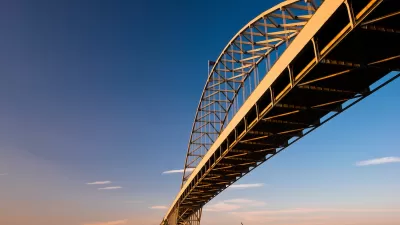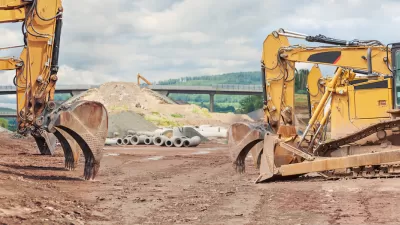Infrastructure spending is becoming a dividing issue amongst political factions in America, according to this piece from Wired.
"Increasingly, infrastructure investment and mass transportation are framed by the liberal-conservative divide, turning relatively straightforward municipal issues into cultural and ideological battles. With our transportation infrastructure literally falling apart - the American Society of Civil Engineers puts the repair bill at $2.2 trillion - the United States faces an interesting dilemma.
A thriving economy is desperately needed to increase wealth, decrease unemployment and wean people off federal entitlement programs fiscal conservatives hate. A dependable and indirect method of stimulating the economy is driving down the cost and energy required to move goods and services by investing in our roads, railways, bridges and other infrastructure. That by definition requires massive amounts of public money.
There was nothing remotely close to a representative survey conducted at Tuesday's Tea Party, but my casual questioning of some in the crowd suggested that resistance to infrastructure investment hinges on concerns that it would result in a net loss."
FULL STORY: Infrastructure Politics Veering Right

Planetizen Federal Action Tracker
A weekly monitor of how Trump’s orders and actions are impacting planners and planning in America.

Map: Where Senate Republicans Want to Sell Your Public Lands
For public land advocates, the Senate Republicans’ proposal to sell millions of acres of public land in the West is “the biggest fight of their careers.”

Restaurant Patios Were a Pandemic Win — Why Were They so Hard to Keep?
Social distancing requirements and changes in travel patterns prompted cities to pilot new uses for street and sidewalk space. Then it got complicated.

Platform Pilsner: Vancouver Transit Agency Releases... a Beer?
TransLink will receive a portion of every sale of the four-pack.

Toronto Weighs Cheaper Transit, Parking Hikes for Major Events
Special event rates would take effect during large festivals, sports games and concerts to ‘discourage driving, manage congestion and free up space for transit.”

Berlin to Consider Car-Free Zone Larger Than Manhattan
The area bound by the 22-mile Ringbahn would still allow 12 uses of a private automobile per year per person, and several other exemptions.
Urban Design for Planners 1: Software Tools
This six-course series explores essential urban design concepts using open source software and equips planners with the tools they need to participate fully in the urban design process.
Planning for Universal Design
Learn the tools for implementing Universal Design in planning regulations.
Heyer Gruel & Associates PA
JM Goldson LLC
Custer County Colorado
City of Camden Redevelopment Agency
City of Astoria
Transportation Research & Education Center (TREC) at Portland State University
Camden Redevelopment Agency
City of Claremont
Municipality of Princeton (NJ)





























